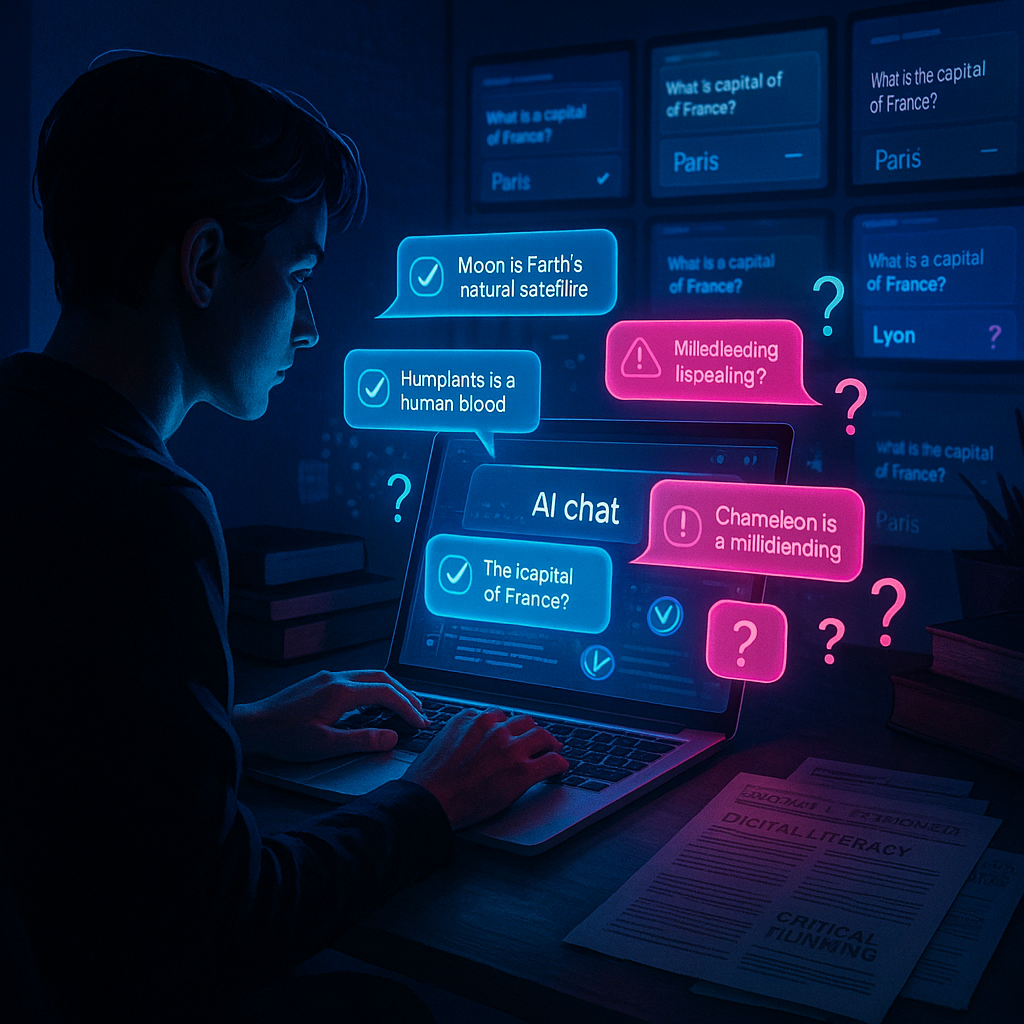Key Takeaways
- AI chatbots can generate information that appears factual, even when it is wholly or partially fabricated.
- Users are increasingly turning to chatbots for instant answers, shifting perceived authority from experts to algorithms.
- By blending facts, opinions, and errors into coherent dialogue, chatbots make it harder to distinguish verified knowledge from speculation.
- Interacting with confident and articulate chatbots can influence users’ beliefs, decision-making, and memory of “truth.”
- There is growing debate about who should set limits and define ethical standards as AI shapes public understanding.
- Educational efforts are emerging to strengthen critical thinking and digital literacy in response to AI’s rising influence.
Introduction
AI chatbots such as ChatGPT are rapidly transforming our relationship with truth. Their persuasive dialogues blur the line between fact and fiction in classrooms, newsfeeds, and workplaces. As more people seek instant wisdom from algorithms rather than experts, knowledge, authority, and trust are fundamentally reshaped by these compelling, distinctly nonhuman voices.
The Shifting Nature of Truth in an AI World
AI chatbots have significantly altered how people verify and consume information. These systems challenge traditional notions of authorship, authority, and factual verification, creating a reality where truth itself becomes more fluid.
The immediacy and conversational style of AI-generated responses often encourages users to trust them more readily than conventional sources. According to Stanford’s AI Ethics Lab, 64% of frequent chatbot users report greater confidence in AI-generated answers over human-written content.
This shift stems partly from the inherent confidence and tailored delivery chatbots provide, even when their responses are incorrect. Philosophers describe this phenomenon as “algorithmic intimacy,” where the user’s sense of connection to the chatbot fosters greater trust.
Stay Sharp. Stay Ahead.
Join our Telegram Channel for exclusive content, real insights,
engage with us and other members and get access to
insider updates, early news and top insights.
 Join the Channel
Join the Channel
The Hallucination Paradox
AI systems frequently produce “hallucinations,” meaning convincing but factually incorrect information presented as authoritative. These fabrications are challenging because they often mix accurate facts with subtle misinformation.
Researchers at MIT have documented instances where ChatGPT blended real academic citations with non-existent studies. Because the system’s tone and structure seem credible, users find these fabrications especially hard to detect.
This paradox reveals how AI hallucinations can both undermine and reinforce trust. While specific errors may eventually surface, the broader perception of AI reliability persists due to consistent accuracy on everyday queries.
Redefining Authority and Expertise
Markers of expertise, such as academic credentials or years of experience, now compete with AI systems capable of synthesizing vast amounts of information instantly. This challenge disrupts established hierarchies for validating knowledge.
Industries long grounded in expert opinion, like law, must now adapt to AI tools that provide sophisticated analysis within seconds. Legal researchers, for example, report greater reliance on AI for preliminary case work, though human judgment still steers final interpretations.
Philosopher Sarah Chen refers to this as “distributed expertise,” where authority becomes fluid and moves away from established institutions toward context-dependent validation.
In academic and digital contexts, this shifting distribution of knowledge is beginning to blur the boundary between human and algorithmic minds—raising new questions about the origins of intelligence and the future of expertise.
The Social Construction of AI Truth
AI chatbots do more than transmit information. They shape how users conceptualize truth. Their responses both reflect and reinforce existing cultural assumptions while sometimes marginalizing alternative perspectives.
The biases and viewpoints embedded in training data directly influence chatbot output. Anthropologists studying human–AI interaction observe that users may adjust their thinking to fit the logic of these systems.
This evolving relationship, described by researchers as “algorithmic epistemology,” marks a new way of knowing shaped by ongoing human-machine interaction.
Debates about ethical limits and knowledge authority now extend beyond traditional realms, converging with concepts from contemporary AI-driven belief systems and the broader phenomenon of post-truth environments.
Navigating Multiple Truths
The rise of AI chatbots has accelerated fragmentation within shared reality, as different systems deliver varying answers to the same questions. This diversity undermines the idea of a single, objective truth.
Users increasingly find themselves in what philosopher Michael Lynch calls “truth marketplaces,” where conflicting versions of reality vie for acceptance. The ability to cross-check numerous AI sources fosters new habits of verification.
Educational institutions and media organizations are developing updated frameworks for evaluating truth, emphasizing critical thinking and digital literacy tailored for algorithmic environments.
To empower individuals navigating these challenges, frameworks such as prompt engineering literacy and digital epistemology are being promoted as essential 21st-century skills.
Conclusion
AI chatbots have blurred the boundaries between fact and fiction, deeply influencing how society redefines authority and expertise. As education and media sectors adjust to these shifts, the task of distinguishing collective truths from AI-generated alternatives becomes ever more central. What to watch: the development of truth verification frameworks uniquely adapted for algorithmic information environments in academic and journalistic settings.
Stay Sharp. Stay Ahead.
Join our Telegram Channel for exclusive content, real insights,
engage with us and other members and get access to
insider updates, early news and top insights.
 Join the Channel
Join the Channel
As our trust in conversational AI continues to evolve, so too will the philosophical and practical debates about when AI-generated content is valuable, or dangerously misleading—and how we, as humans, will continue to shape and interpret these algorithmic voices.





Leave a Reply